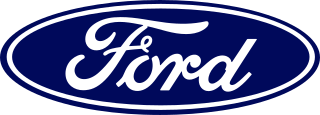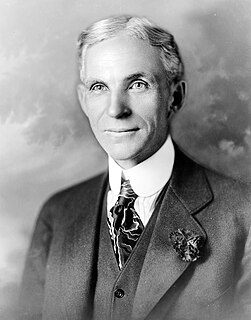The Reconstruction Finance Corporation was a government corporation administered by the United States Federal Government between 1932 and 1957 that provided financial support to state and local governments and made loans to banks, railroads, mortgage associations, and other businesses. Its purpose was to boost the country's confidence and help banks resume daily functions after the start of the Great Depression. The RFC became more prominent under the New Deal and continued to operate through World War II. It was disbanded in 1957, when the US Federal Government concluded that it no longer needed to stimulate lending.

The term 1932 Ford may refer to three models of automobile produced by Ford Motors between 1932 and 1934: the Model B, the Model 18, and the Model 40. These succeeded the Model A. The Model B had an updated four cylinder and was available from 1932 to 1934. The V8 was available in the Model 18 in 1932, and in the Model 40 in 1933 & 1934. The 18 was the first Ford fitted with the flathead V-8. The company also replaced the Model AA truck with the Model BB, available with either the four- or eight-cylinder engine.

Financial services are the economic services provided by the finance industry, which encompasses a broad range of businesses that manage money, including credit unions, banks, credit-card companies, insurance companies, accountancy companies, consumer-finance companies, stock brokerages, investment funds, individual asset managers, and some government-sponsored enterprises.
GE Capital is the financial services division of General Electric.

The Hertz Corporation, a subsidiary of Hertz Global Holdings, Inc., is an American car rental company based in Estero, Florida, that operates approximately 12,000 corporate and franchisee locations, both domestically and internationally. As one of the largest worldwide vehicle rental companies by sales, locations, and fleet size, Hertz operates in 160 countries in North America, Europe, Latin America, Africa, Asia, Australia, the Caribbean, the Middle East and New Zealand. The Hertz Corporation also owns Firefly Car Rental, and the former Dollar Thrifty Automotive Group, which is now separated into the Thrifty Car Rental and Dollar Rent A Car brands.

Ford Motor Credit Company LLC, d/b/a Ford Credit, is the financial services arm of Ford Motor Company, and is headquartered in Dearborn, Michigan.
Equitable PCI Bank, Inc. was one of the largest banks in the Philippines, being the third-largest bank in terms of assets. It was the largest bank before it was overtaken by Metrobank in 1995. It is the result of the merger of Equitable Banking Corporation and Philippine Commercial International Bank or PCIBank. It was known for a wide range of services from savings to insurance and, through its wholly owned subsidiary Equitable Card Network, was the largest Philippine credit card issuer. The bank merged with Banco de Oro Universal Bank in early 2007, and is now branded as BDO as its new identity as part of the new Banco de Oro Unibank, Inc.
HSBC Finance Corporation is a financial services company and a subsidiary of HSBC Holdings. It is the sixth-largest issuer of MasterCard and Visa credit cards in the United States. HSBC Finance Corporation was formed from the legal entity that had been known as Household International—shortly after Household International settled for US$486 million in charges pertaining to predatory lending, after burning through $389 million in legal fees and expenses—and is now expanding its consumer finance model via the HSBC Group to Brazil, India, Argentina and elsewhere.

Ford of Britain is a British wholly owned subsidiary of Ford Technologies Limited, itself a subsidiary of Ford International Capital LLC, which is a subsidiary of Ford Motor Company. Its business started in 1909 and has its registered office in Laindon, Essex. It adopted the name of Ford of Britain in 1960.
Security Bank Corporation (SBC) is a universal bank in the Philippines. It was established on June 18, 1951 as Security Bank and Trust Company and was the first private and Filipino-controlled bank of the post-World War II period.
CT, or the Corporation Trust Company, is a wholly owned subsidiary of Wolters Kluwer, a multi-national information services company based in the Netherlands with operations in more than 35 countries. CT Corporation is the largest registered agent service firm in the world representing hundreds of thousands of business entities worldwide. It provides software and services that legal professionals use. As a provider of registered agent services the company is not responsible for the business or legal affairs of the customers it serves.
Founded in 1921 as Australian Guarantee Company to initially provide finance for purchasers of smaller household items, it progressed into financing motor vehicles and was renamed as Australian Guarantee Corporation (AGC) in 1925. AGC was Australia's oldest national finance company offering a range of finance, investment and insurance products and were market leaders in equipment finance, cashflow finance, motor vehicle and personal finance.

The Ford Motor Company is an American automaker, the world's fifth largest based on worldwide vehicle sales. Based in Dearborn, Michigan, a suburb of Detroit, it was founded by Henry Ford on June 16, 1903. Ford Motor Company would go on to become one of the largest and most profitable companies in the world, as well as being one of the few to survive the Great Depression. The largest family-controlled company in the world, the Ford Motor Company has been in continuous family control for over 110 years. Ford now encompasses two brands: Ford and Lincoln. Ford once owned 5 other luxury brands: Volvo, Land Rover, Jaguar, Aston Martin, and Mercury. Over time, those brands were sold to other companies and Mercury was discontinued.

Ford India Private Limited is a subsidiary of Ford Motor Company for its operations in India. Ford India Private Limited's headquarter is located in Sholinganallur, Chennai, Tamil Nadu. Ford also has integrated manufacturing facilities in Sanand, Gujarat. Ford has now decided to move out of Indian market as it failed to catch up pace with the competition and other global economic factors that led to reduction in demand.
The New York State Banking Department was created by the New York Legislature on April 15, 1851, with a chief officer to be known as the Superintendent. The New York State Banking Department was the oldest bank regulatory agency in the United States.
Walter E. Heller (1891–1969) was a US financier and philanthropist, who founded Walter E. Heller and Company, Inc., Chicago, Illinois with money borrowed from his father in 1919. He originally started the company to do "automobile financing" as autos became more popular in the 1920s. The firm developed into a highly successful, multi-faceted international financial company that was a leader in various fields of finance, particularly in factoring.

The automotive industry in the United States began in the 1890s and, as a result of the size of the domestic market and the use of mass production, rapidly evolved into the largest in the world. The United States was the first country in the world to have a mass market for vehicle production and sales and is a pioneer of the automotive industry and mass market production process. During the course of the 20th century global competitors emerged especially in the second half of the century primarily across European and Asian markets, such as Germany, France, Italy, Japan and South Korea. The U.S. is currently second among the largest manufacturer(s) in the world by volume.

Ford Motor Company is an American multinational automobile manufacturer headquartered in Dearborn, Michigan, United States. It was founded by Henry Ford and incorporated on June 16, 1903. The company sells automobiles and commercial vehicles under the Ford brand, and luxury cars under its Lincoln luxury brand. Ford also owns Brazilian SUV manufacturer Troller, an 8% stake in Aston Martin of the United Kingdom and a 32% stake in China’s Jiangling Motors. It also has joint ventures in China, Taiwan, Thailand, Turkey, and Russia. The company is listed on the New York Stock Exchange and is controlled by the Ford family; they have minority ownership but the majority of the voting power.
Briggs Manufacturing was an American, Detroit-based manufacturer of automobile bodies for Ford Motor Company, Chrysler Corporation and other U.S. and European automobile manufacturers.






